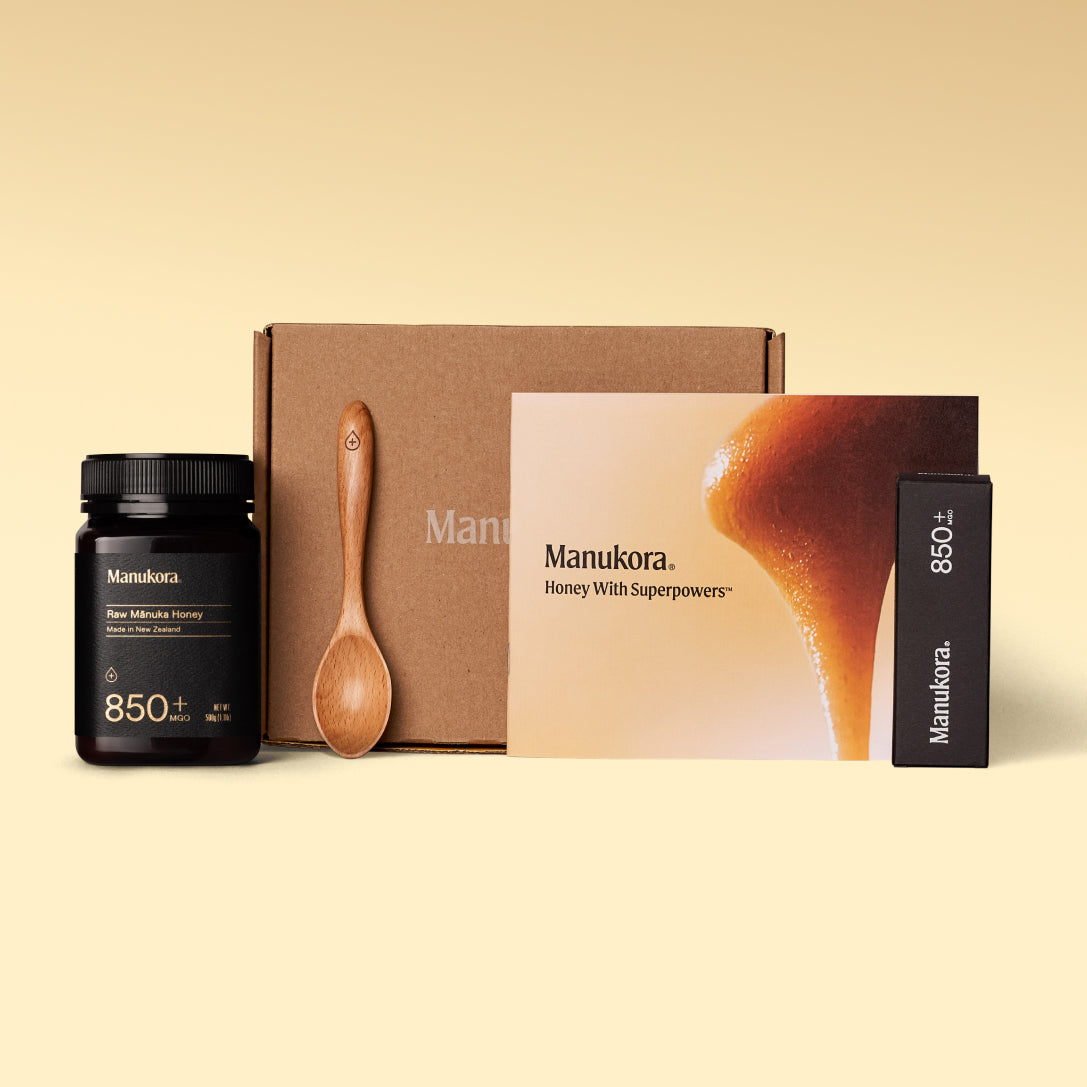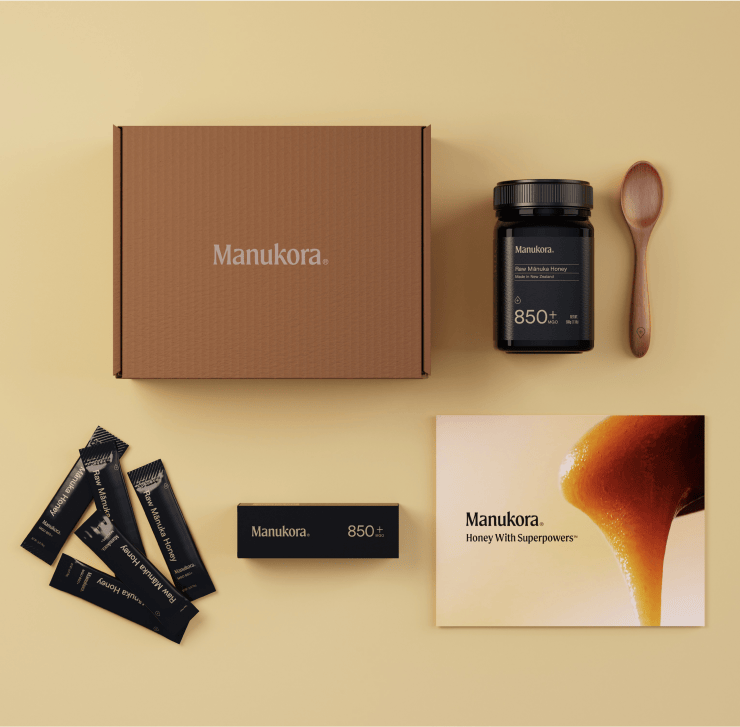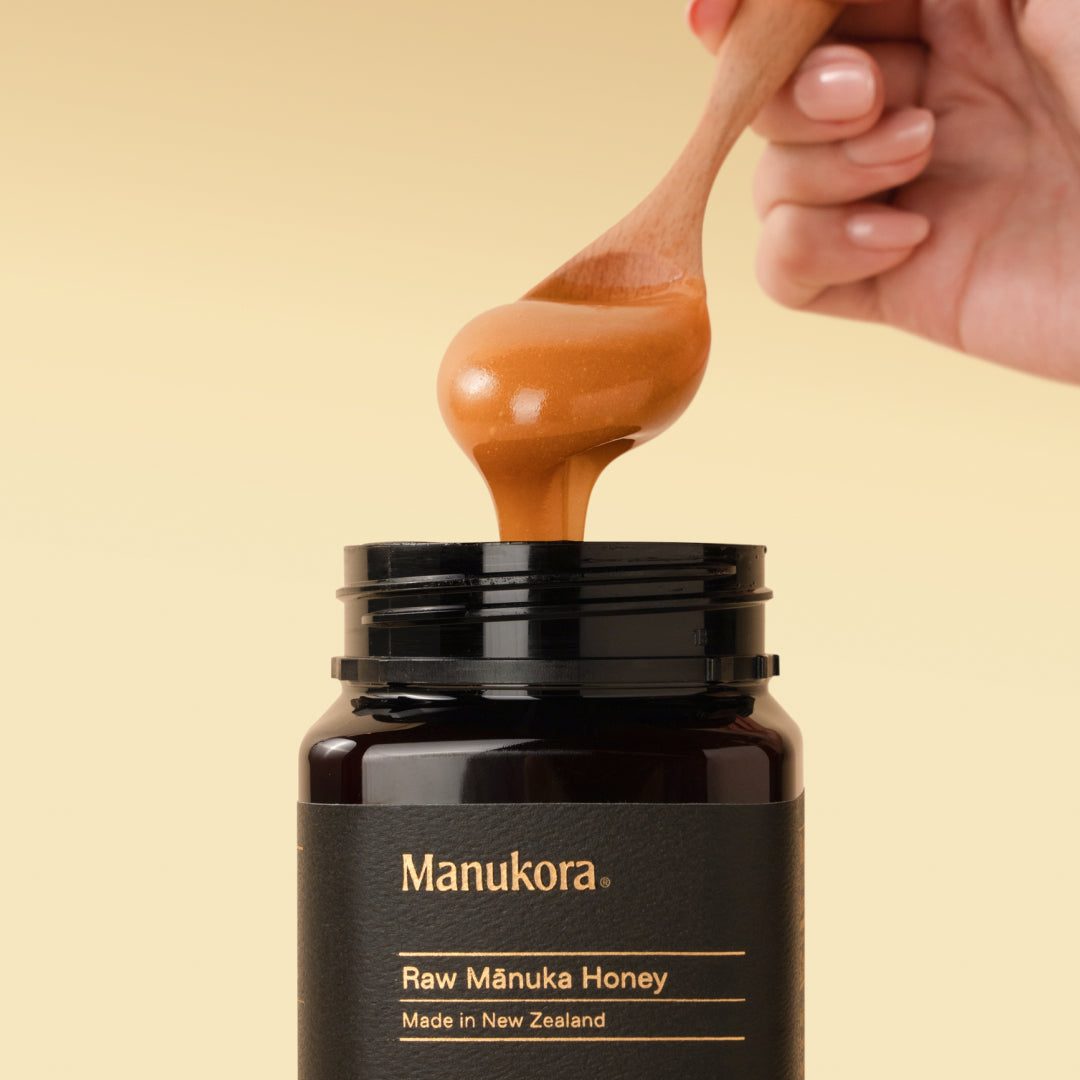Key Takeaways
-
Manuka honey contains naturally occurring nutrients like MGO and antioxidants, which contribute to its role as a whole-food sweetener with wellness-supportive properties.
-
When paired with nutrient-dense, whole foods, Manuka honey can complement a balanced, anti-inflammatory lifestyle.
-
As part of a mindful routine, Manuka honey may support healthy immune and digestive function while adding natural flavor and traceable quality to your meals.
Manuka Honey in Anti-Inflammatory Diets: A Nutrient Review
Anti-inflammatory diets have grown in popularity as more people explore ways to support long-term wellness through mindful eating.
With processed foods common in modern routines, it’s no surprise that individuals are turning to nutrient-dense, natural ingredients to complement their health goals.
One ingredient that frequently draws attention is Manuka honey—a single-origin honey known for its naturally occurring MGO (methylglyoxal) and antioxidant content.
While it still contains natural sugars, its unique composition makes it a whole-food sweetener worth exploring in the context of intentional diets.
In this article, we’ll take a closer look at how Manuka honey can support overall wellness and how it may complement an anti-inflammatory dietary approach when used in moderation.
What Is an Anti-Inflammatory Diet?
Inflammation is the body’s natural defense mechanism triggered by injury, irritants, or environmental stressors. While short-term inflammation is part of the healing process, long-term or chronic inflammation has been linked to various health concerns. That’s where the concept of an anti-inflammatory diet comes into play.
An anti-inflammatory diet emphasizes whole, unprocessed foods that are naturally rich in nutrients like antioxidants, omega-3 fatty acids, and fiber all of which help support the body’s natural balance.
Some common staples of this dietary approach include:
-
Healthy fats – olive oil, avocado, nuts and seeds
-
Colorful fruits and vegetables – rich in plant-based compounds
-
Whole grains – such as oats, brown rice, and quinoa
-
Lean proteins – like salmon and legumes
At the same time, this approach typically limits foods that are highly processed, high in added sugars, or refined, such as sugary beverages and processed meats.
So, where does Manuka honey fit in?
Unlike refined sugars and syrups, Manuka honey is a naturally occurring sweetener that contains glucose, fructose, and trace amounts of amino acids, vitamins, minerals, and antioxidants.
With a lower glycemic index than table sugar, it offers a whole-food alternative that may complement an anti-inflammatory dietary lifestyle when used mindfully.
Manuka honey can be a more thoughtful choice for those seeking to align their sweeteners with whole-food, nutrient-aware eating habits.
Nutritional Profile of Manuka Honey
What sets Manuka honey apart from regular honey is its unique composition, shaped by the nectar of the Manuka tea tree and the environment in which it’s harvested.
This single-origin honey contains a range of naturally occurring compounds that contribute to its rich taste and wellness-supportive properties.
Among the most notable components is MGO (methylglyoxal)—a compound that serves as a key quality marker for Manuka honey. MGO, along with flavonoids and phenolic acids (naturally occurring antioxidants), contributes to Manuka honey’s complex profile.
These nutrients are known to:
-
Help support the body’s natural immune response
-
Contribute to antioxidant activity, which plays a role in cellular health
-
Offer a more nutrient-rich alternative to refined sweeteners
While MGO is often recognized for its role in supporting microbial balance, it’s the combination of naturally occurring sugars, antioxidants, and trace nutrients that make Manuka honey a potential fit for individuals exploring whole-food, wellness-focused dietary approaches.
It’s not just about sweetness, Manuka honey brings traceable quality and a depth of nutrients that reflect the care in every jar.
Manuka Honey in Anti-Inflammatory Diets
Bringing Manuka honey into your daily routine can be a delicious way to complement an anti-inflammatory lifestyle—especially when paired with whole, nutrient-dense ingredients. While it still contains natural sugars and should be enjoyed in moderation, its unique profile makes it a more thoughtful alternative to refined sweeteners.
Here are some simple and satisfying ways to use Manuka honey in everyday meals:
-
Stir into tea: Add a teaspoon to green tea or herbal infusions after they’ve cooled slightly to preserve the honey’s natural properties.
-
Blend into smoothies: Combine Manuka honey with ingredients like berries, leafy greens, and flaxseed for a naturally sweet, nutrient-rich beverage.
-
Drizzle over oatmeal or yogurt: Enhance the taste of your breakfast by pairing Manuka honey with fiber-rich oats, nuts, and seeds.
-
Use in dressings or glazes: Mix it with olive oil, mustard, or citrus juice for a flavorful salad dressing or marinade.
These integrations don’t just add sweetness—they allow you to enjoy honey as part of a whole-food approach, blending taste and nutrition in a way that supports a mindful diet.
When paired with antioxidant-rich foods, Manuka honey becomes a part of a balanced, intentional way of eating.
Research and Evidence
While scientific research on Manuka honey is ongoing, some studies have explored its naturally occurring compounds such as MGO (methylglyoxal) and their role in supporting overall wellness.
For example, a study published in Food Chemistry examined Manuka honey’s bioactive components, highlighting their antioxidant content and potential to support immune health through general mechanisms like oxidative stress reduction.
These findings contribute to a growing body of interest in how certain natural foods may support the body’s balance when part of a nutrient-rich diet.
It’s important to note, however, that these studies are exploratory in nature and do not offer conclusive health outcomes.
While the presence of MGO and antioxidants makes Manuka honey a compelling ingredient in wellness-focused diets, it should not be viewed as a treatment or replacement for professional medical care.
Instead, Manuka honey may serve as a complementary component within a balanced, whole-food lifestyle that includes a variety of plant-based, antioxidant-rich foods.
Early studies support the idea that Manuka honey’s unique compounds can play a role in wellness but always within the context of a broader, nutrient-aware diet.
Guidelines for Consuming Manuka Honey
Like any natural sweetener, Manuka honey is best enjoyed in moderation especially if you're integrating it into a nutrient-aware or anti-inflammatory lifestyle.
A common recommendation is to enjoy 1–3 teaspoons per day (approximately 14g per serving). This allows you to savor its rich flavor and naturally occurring compounds while staying mindful of your total sugar intake.
For best results, consume Manuka honey in its raw form. Because high heat may affect its natural properties, it’s ideal to:
-
Add it to teas or infusions after they’ve cooled for 30–60 seconds
-
Stir it into smoothies or yogurt instead of cooking or baking with it
-
Use it as a finishing drizzle over meals rather than during high-heat preparation
These simple habits can help you make the most of Manuka honey’s natural integrity as part of a balanced diet.
To preserve the natural goodness in Manuka honey, avoid high heat and let it shine as a finishing touch or stirred into slightly cooled foods and drinks.
FAQs
Is Manuka honey anti-inflammatory?
Manuka honey contains naturally occurring compounds like MGO and antioxidants, which are often explored in wellness-focused diets. While research is ongoing, Manuka honey is best seen as a natural, whole-food sweetener that may complement a balanced lifestyle.
Can I use Manuka honey in an anti-inflammatory diet?
Yes, when used in moderation, Manuka honey can be a flavorful addition to an anti-inflammatory diet—especially when paired with whole foods like fruits, oats, and healthy fats.
What makes Manuka honey different from regular honey?
Manuka honey is derived from the nectar of the Manuka tea tree and is known for its MGO content, traceability, and dense texture. It also contains naturally occurring antioxidants, amino acids, and nutrients not always found in processed commercial honeys.
How much Manuka honey should I consume daily?
A common recommendation is 1–3 teaspoons per day. This allows you to enjoy its taste and unique qualities without excessive sugar intake. Always consume in moderation.
Can I add Manuka honey to hot drinks or meals?
Yes, but it's best to let hot beverages or food cool slightly before adding Manuka honey. High heat may affect its natural properties, so it’s ideal as a finishing touch or stirred into warm—not boiling—liquids.
Does Manuka honey contain antioxidants?
Yes, Manuka honey naturally contains antioxidants such as flavonoids and phenolic acids, which support overall wellness and help maintain cellular health as part of a balanced diet.
A Naturally Sweet Step Toward Everyday Wellness
If you're exploring anti-inflammatory diets, chances are you're seeking more balance, more nourishment, and more intentional choices in your daily routine.
While no single ingredient is a cure-all, incorporating whole, minimally processed foods including Manuka honey can help support a more mindful approach to wellness.
With its unique taste, naturally occurring compounds like MGO, and traceable origins, Manuka honey offers more than just sweetness it reflects care, quality, and a connection to nature.
Explore Manukora’s range of high-grade MGO Manuka honeys, crafted with sustainable practices and The Art of Ethical Beekeeping™.


















